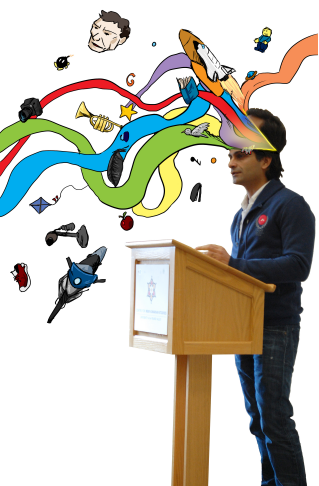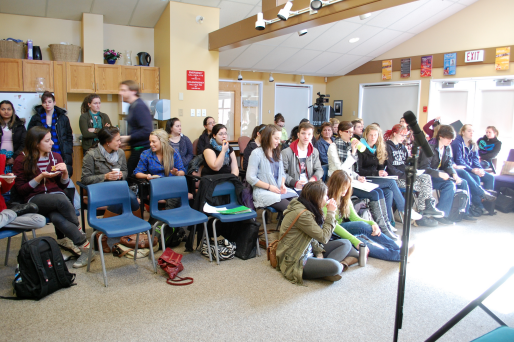Print Edition: February 1, 2012
UFV’s fifth writer in residence began his term with a reading and student-attended opening gala this past Thursday. Anosh Irani, award winning playwright and novelist, read excerpts of his work, engaged in a public interview conversation with English instructor Trevor Carolan and also answered student questions about his career.
A creative writing graduate from UBC’s BFA program, Anosh Irani writes with heavy substance, specifically social issues in the dark places of Bombay: the red light district, the underbelly of the city, the poor and the underprivileged. He’s just returned from India where he’s working on a film about the plight of farmers caught in the terrible debt crisis.
Irani read to the audience two passages, one of a family driven from their home and a dismal, psychologically twisted prelude of the story of a eunuch. The question period, predictably, dwelt on the nature of Irani’s stories, and how he himself deals with the heavy subject matter.
“I do write about very dark subjects,” Irani said, “but I think what has really helped me also is that in my work there is also always the balance provided by a sense of humour, and that is really something you should keep in mind. I mean, you can’t manufacture a sense of humour so if you don’t have one, okay, and I feel bad for you… But if you do have a sense of humour, try [to] understand that darkness works only if there is something to counter it; the darkness keeps things grounded, the reality is grounded but the humour gives it a lightness that makes it accessible as a reader.”
His writing follows characters facing poverty, suicide, violence and political turmoil. Irani explains that the darkness of his material doesn’t bring him down. “I’ve heard some writers cry when their characters die and it’s a waste of time, really. You just have to get on with it… I’m aware of my characters but I don‘t really sit down and cry… instead of catharsis you reach a level of understanding, that you never had before, and I think that is more valuable; that wisdom is more valuable.”
Though Irani writes about these social issues in Bombay, he doesn’t feel as though he’s taken on a cultural responsibility. Rather, he chooses to see the responsibility of a writer as being an observer outside the existing structure. “If you are operating within the structure you are part of it, and you will fall into the same holes that everyone else is falling into,” he said. You must be an observer, a witness.
“What are you being witness to? The truth. And that has nothing to do with cultural responsibility… And to get to the truth, you need to shatter everything you know.”
Being within the structure can create no effect on the reader. “The minute someone expects me to do something, they’re going to be disappointed and this is an interesting tool to use in your writing. Even in my plays, I always start a monologue that’s funny… the idea is to make people relax. Because then you can punch them in the stomach.”
“If you know you’re going to be punched in the stomach, you’re going to be tensed and ready, but if you’re thinking, ‘oh what a sweet play, sweet guy’ you get beaten up. That’s what art should do. It’s not a complacent thing. It should not make you feel comfortable.”
Anosh Irani is excited to start working with aspiring writers at UFV. “As a novelist you end up spending a lot of time in isolation and I enjoy teaching… It’s always interesting for me to get young people excited about writing and expose them to writers they may not have read or not have heard of. I’m hoping the students come here and I’m happy to read their work, but more importantly have a conversation, what it takes to be a writer. And I think it’s important to talk to a writer who is actually alive.”
Anosh Irani will be on campus Mondays and Thursdays. He will be visiting classes and conducting private consultations for writers during his office hours, 12:30-5:30 p.m. These meetings are ideal for writers who want additional critique from a high profile writer, as well as questions answered about what it takes to be a writer. Irani can be contacted by email for an appointment.
Anosh Irani took some time to answer the queries of some of the students present at the gala
 What was something you learned as a creative writing student at UBC?
What was something you learned as a creative writing student at UBC?
What I learned in the writing workshops, is that almost everyone can write. But not everyone has a story to tell. That is the single most important thing for me: why are you choosing to tell this story, are you compelled to tell it? It has to mean something to you. And the only reason to tell a story is because you are compelled, you are totally consumed by it, and if you don’t tell that story you can’t live. You can’t live if you don’t tell that story and that is the only reason you should be writing that story.
How do you know when to stop editing, if you can never reach the perfect version of the story you had envisioned?
There is no such thing as a perfect story. It doesn’t exist. Perfectionism cannot exist in literature. It can exist in mathematics because there is an answer. There is only one answer… a final answer. But with literature there is no solution. You just ask questions and continue to ask questions and continue to create, and at some point you have to write the whole thing. What’s the worst thing that could happen? It will be the worst thing in the world. That’s the worst thing that can happen. But something beautiful can also happen. If you write the whole thing, you will discover that you can write. If you keep editing that one chapter it will take away your joy for story-telling, take away the juice that you have. This is what happens to books that are over-edited. Everything is perfect, the language is perfect, but there is no soul. And soul can only come through if you’re willing to take the risk, when you are humble enough to make mistakes.
What’s your writing process like? How do you deal with writer’s block?
I need food. I feel like passing out if I don’t eat, I just love to eat… I don’t like outlines, I just [start] writing. There are times when I do not remember writing certain pages. There are pages and pages that I do not remember writing. I never read my work unless I’m at a reading, and when I flip through I’ll be like “wow that’s good.” It depends on how you are as a person; if you like a lot of security, if you like method, make an outline. There’s nothing wrong with that. But sometimes it’s important to throw everything away and just jump. And 99 per cent of the time you will fail. But the one percent of the time you actually get something, it’s really valuable. So, there’s a balance… Sometimes it’s just important to play, that’s what makes writing fun. I don’t believe in writer’s block. If I can’t write then I think obviously someone up there is not doing his job. It’s not me. This helps keep things light, and helps me relax. Because I don’t think there is any such thing as writer’s block. It doesn’t really exist.
How did you get into writing?
I always loved telling stories, even as a child. As an only child, I’d tell stories to myself… that desire to tell stories comes from my family; most of them drink and tell stories. I don’t drink. I was lucky enough to be an observer when all of them were three whiskeys down… Even when I go back now, it’s the storytelling sessions that I really love – when my cousins get together, when my family gets together.
What’s one piece of advice for aspiring writers at UFV?
Just take a risk. There’s something that is gained when you take a risk… you have to be ready to fail in order to get something that is unconventional. Otherwise play it safe, get something conventional, and be boring. That is another option… you have to learn how to be accessible, how to be entertaining but at the same time the reader or the audience should never be the same after they read your book. If they are the same, then you should write another book.




